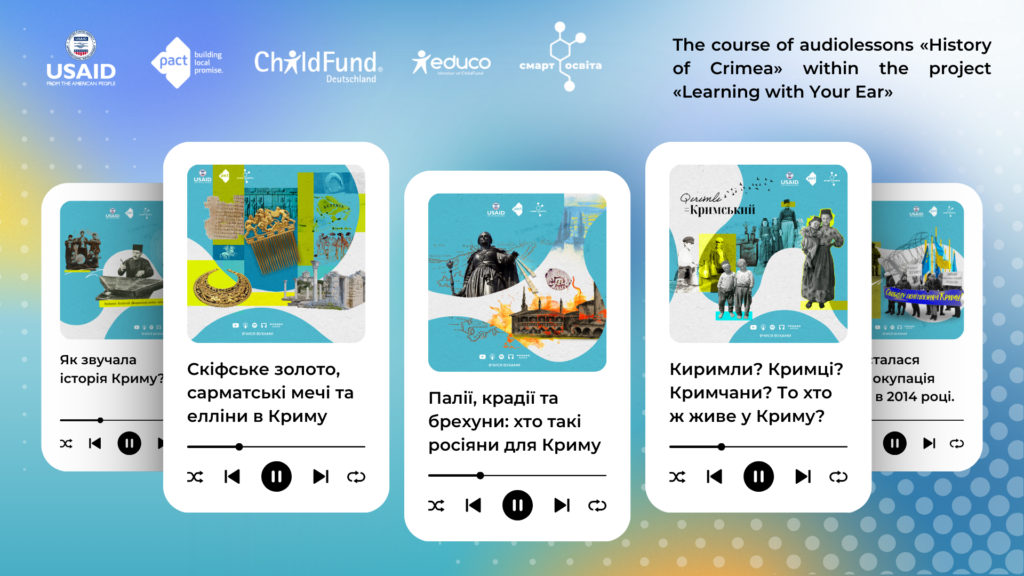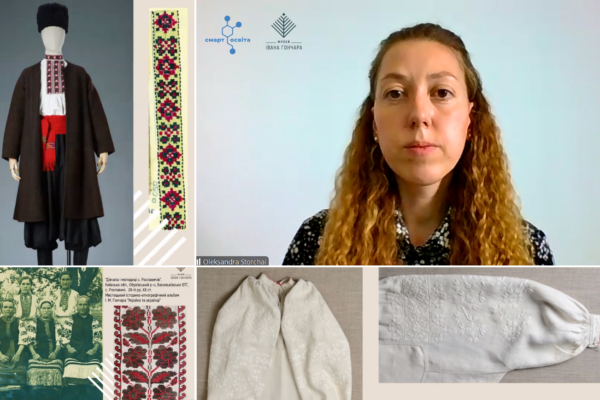

More than 20 audiolessons in three subjects: “History”, “Culture”, “People” are already available for everyone who wants to know more about the history of the peninsula, see and understand the Indigenous peoples, their history and culture, and also understand the continuity of the historical connection between continental Ukraine and Crimea.
One lesson is 15 minutes long, and the lessons are all available on the project’s website. The resource also includes a collection of “Crimean lessons” with programme lessons in Ukrainian Literature and the History of Ukraine. The course is still being developed, and new lessons will become available on the website and podcast platforms.
In the course “History of Crimea” the listeners will learn:
- what were the first settlements and states of the peninsula;
- how Christianity in Ukraine-Rus started from Crimea;
- who are the Indigenous peoples of Crimea: Crimean Tatars, Karaites, and Krymchaks, what history and culture do they preserve;
- what were the relations between ethnic Ukrainians and Indigenous peoples of Crimea throughout the centuries;
- what the history of the peninsula sounds like;
- how, during the last centuries, the Russians have been committing crimes against the Indigenous peoples of Crimea and how these are related to the Russian crimes against the Ukrainian people;
- what are the consequences of the Russian imperial colonization of the peninsula;
- about the blood-drenched pages of history that continental Ukraine and Crimea share;
- what are the common heroic pages of the fight against Russia of the Crimean-Tatar and Ukrainian peoples;
- and about the resistance to the Russian occupation in Crimea.
“In 2023, I was at an Arsenal Book Festival event at the discussion of the modern literature about Crimea. After the event one of the boys said, “I am a 10th grader, and all my life I have heard that Crimea is Ukraine. But I do not know what Crimea is.” These words really touched me. The current history program includes information about the history of the Crimean Khanate, the deportation of the Crimean Tatars, and the events in Crimea in 1918. But there is no comprehensive answer for the children who have never seen the peninsula, who have some empathy for it, and who know about the indigenous peoples, their history, culture, and the struggle that they are waging even today. That is why in “Learn with Your Ears,” we wanted to make a step towards the integration of Crimean history into the History of Ukraine. In cooperation with Gulnara Anvar qızı Abdulayeva and Martin-Oleksandr Kisly, we selected the questions that should be answered. As is the case with our other audiolessons, we will recommend using them in the academic process to learn more, to find the answers to complex questions and to just learn more about Crimea, which is becoming so remote for the new generations,” – says “Learn with Your Ears” project manager Iryna Sharova.
The essential component of the course is working with stereotypes and Russian narratives about Crimea: the authors talk about the origins of the idea that the peninsula is allegedly a recreation resort or just “idle lands”‘; why the authentic names of the towns and villages in Crimean-Tatar have disappeared, and how with each consecutive Russian occupation, there were more and more efforts to make the peninsula the “ancestral Russian land”. For centuries, Russia has been shaping a hostile attitude towards the indigenous peoples of Crimea and many other harmful narratives that we should have gotten rid of long ago.
The authors of the course are historians, political figures, cultural scientists, Crimean Tatar linguists and public activists.
- Tamila Tasheva, the Permanent Representative of the President of Ukraine in the Autonomous Republic of Crimea, a human rights activist and co-founder of the civil society organization “CrimeaSOS”.
- Gulnara Anvar qızı Abdulayeva, historian and author of the books “History of Crimea” and “Crimean Tatars: from ethnogenesis to statehood”
- Martin Kisly, PhD in history, lecturer at Kyiv Mohyla Academy.
- Mamure Chabanova, philologist, translator, and teacher of the Crimean Tatar Language
- Ezra Pastor, Karaite, artist
- Arslan Fazilov, an expert in the Crimean Tatar language, lecturer, and translator.
- Ihor Hodzhaniyazov, music expert
- Yuliya Topolnytska, historian, educator at NGO “Smart Osvita”, co-author of history textbooks
- Antonina Makarevych, historian, co-author of history and civic education textbooks
You can listen to the lessons here:
– on the website of the project “Learn with Your Ears”
– in the collection “Crimean Lessons”
– on the platforms Spotify, Apple Podcast, NV, YouTube
The “Learn with Your Ears” project includes free-of-charge audiolessons for grades 6-11 students. The audiolessons will not replace a teacher in the classroom, but they can help to master the subject and mitigate educational losses during outages, in shelters, abroad, or for further education. The course on the history of Crimea is a part of the project of audiolessons “Learn with Your Ears” implemented by “Smart Osvita”.
The website and the podcast platforms have more than 450 lessons in the History of Ukraine, World History and Crimean History, Ukrainian Language and Literature, and Civic Education. The average duration of the audiolesson is 20 minutes. The lessons also have recommendations that can be viewed, listened to or read additionally, and also small practical tasks: self-check tests or essay topics.
The course of audiolessons “History of Crimea” within the “Learn with Your Ears” project is implemented by “Smart Osvita” NGO as part of the USAID/ENGAGE (Enhance Non-Governmental Actors and Grassroots Engagement) programe, which is funded by the United States Agency for International Development (USAID) and implemented by Pact in Ukraine. The contents of this project are the sole responsibility of Pact and its partners and do not necessarily reflect the views of USAID or the United States Government.
This project is implemented due to our cooperation with Childfund Deutschland and EDUCO and is financed by Sternstunden in 2024.



